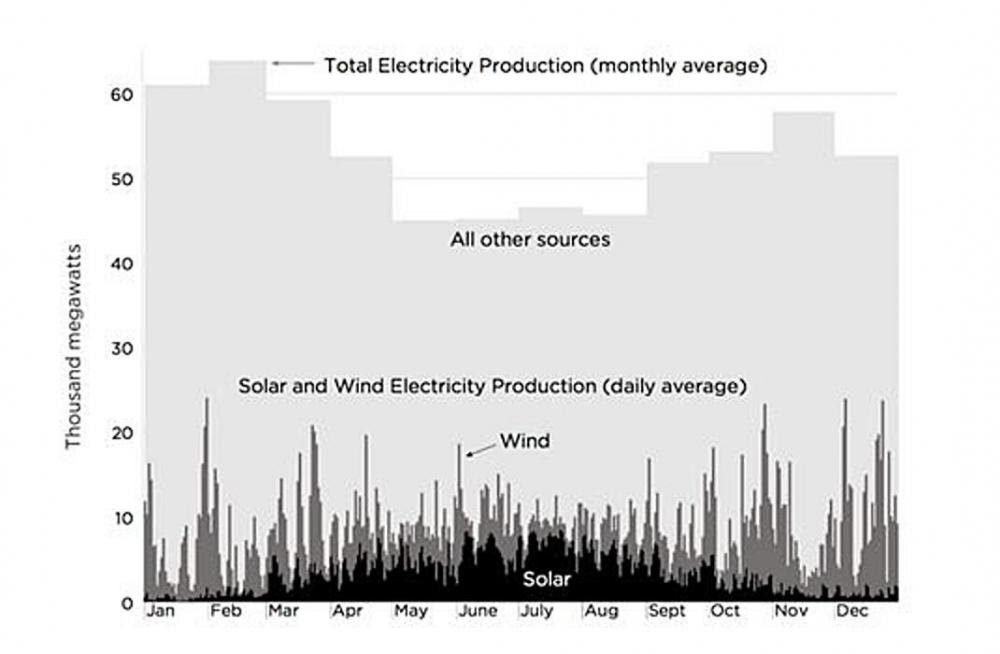From Center for Industrial Progress by Alex Epstein

Last week we looked at the need for a process of producing energy that is cheap, plentiful, and reliable—and we saw that solar and wind cannot produce cheap, reliable energy.
How Germany embraced solar and wind and ended up in energy poverty
Let’s take a look at this in practice. Germany is considered by some to be the best success story in the world of effective solar and wind use, and you’ll often hear that they get a large percentage of their energy from solar and wind.
You can see here on this chart how this claim was made and why it’s not accurate.
First of all, this is just a chart of electricity. Solar and wind are only producing electricity and half of Germany’s energy needs also include fuel and heating. So solar and wind never contribute half as much to Germany’s energy needs as this chart would imply.
But that’s not the biggest problem. What you notice here is that there’s certain days and times where there are large spikes, but there are also periods where there’s relatively little. What that means is that you can’t rely on solar and wind ever. You always have to have an infrastructure that can produce all of your electricity independent of the solar and wind because you can always go a long period with very little solar and wind.
So then why are the solar and wind necessary? Well, you could argue that they’re not and that adding them onto the grid will impose a lot of costs.
In Germany, electricity prices have more than doubled since 2000 when solar and wind started receiving massive subsidies and favorable regulations, and their electricity prices are three to four times what we would pay in the U.S. (Because of its low reliability, solar, and wind energy options require an alternative backup—one that’s cheap, plentiful, and reliable—to make it work, thus creating a more expensive and inefficient process.)
Nuclear and hydro
Fossil fuels are not the only reliable sources. There are two others that don’t generate CO2 that are significant and are more limited, but still significant contributors. Those are hydroelectric energy and nuclear energy.
Hydroelectric energy can be quite affordable over time, but it’s limited to locations where you have the right physical situation to produce hydroelectric power.
Nuclear is more interesting because nuclear doesn’t have the problems of hydro but it’s been very restricted throughout history so today in the vast majority of cases it’s considerably more expensive than say electricity from natural gas. This may change in the future and one thing we’ll discuss under policy is how we need to have the right policies so that all energy technologies can grow and flourish, if indeed the creators of those technologies can do it.
The reality of energy poverty: a story
To illustrate just how important it is to have cheap, plentiful, and reliable energy, I want to share a story I came across while doing research for my book, The Moral Case for Fossil Fuels. This is a story about a baby born in the very poor country of Gambia.
The baby was born underweight and premature, but not in such a way that would be a big problem in say, the United States. In the United States, the solution would have been obvious: incubation. This technology would almost certainly bring this baby up to be completely healthy, and if you met the baby later in life you would never know that there had ever been a problem.
Unfortunately, in the Gambia, in this particular hospital, they needed something that billions of people in the world do not have, and that is reliable electricity.
Without reliable electricity, the hospital didn’t even contemplate owning an incubator, the one thing this baby desperately needed to survive.
Without access to this technology, the baby could not survive on her own, and sadly, she died. I think this story reminds us of what it means to have access to cheap, plentiful, and reliable energy, and how having more energy gives us the ability to improve our lives.
To summarize what we discussed, if you can’t afford energy you don’t have energy, and if energy is scarce or unreliable, then you don’t have energy when you need it. It’s not just enough to have energy, the energy and the process to create it has to be cheap, plentiful, and reliable.
